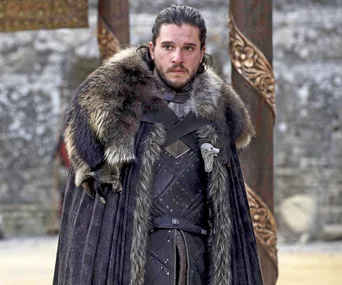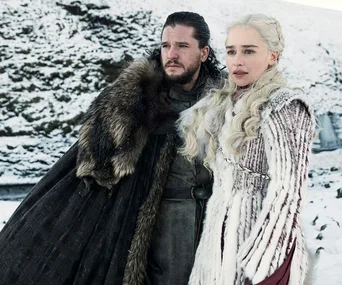Not many people, and certainly not anyone in Westeros, are sad to see The Night King go, especially at the stealth, super-sneaky (right) hand of Arya Stark.
But one person would have shed a tear for the fearsome foe – if he still felt emotions, and if he were still a person: The Three-Eyed Raven, the Ancient Being Formerly Known As Bran Stark.
TV WEEK got a chance to catch up with the Game of Thrones greenseer himself, Isaac Hempstead Wright, while he was in Sydney. As Isaac, the 20-year-old actor climbed the Harbour Bridge, took in Taronga Zoo, toured the Opera House and even lost $100 playing two-up in Caringbah. But he also got to see the epic Battle of Winterfell for the first time whilst in his hotel room.
TV WEEK: What was it like watching season eight, episode three, just now, and how different is it with all the effects added as opposed to doing the filming?
Isaac: Even though I’ve read the scripts and know exactly what’s happening, I was absolutely on the edge of my seat! It was so captivating. I truly think that’s one of the biggest pieces of television that there’s ever going to be, ever.

“I was absolutely on the edge of my seat!” Isaac says of the recent episode (Image: Helen Sloan/HBO).
TV WEEK: And for you, it’s very tense because we’re seeing everybody get the action, but then you come in at the very end.
Isaac: Well, I think Bran is obviously not going to be the one who’s got a sword and is charging through and trying to save the day. Bran is, obviously, in that situation, going to be very still and calm and his classic Three-Eyed Raven self.
TV WEEK: Your character has evolved to the point where so much of the acting that you have to do is just through your face, through your eyes, even if they are rolled back.
Isaac: It’s been a really interesting task to take on, especially because you don’t want Bran just to become boring. Because, if he just sits there and speaks in the same tone all the time, and knows everything, it is not much fun in watching that. So we wanted to keep some weirdness and mystery about him. As well, Bran doesn’t say very much. He’s very, very thoughtful about the words he uses. He uses them very rarely, just sits there observing cause that’s what the Three-Eyed Raven does.
So it’s been fun and challenging to try and not just let him become dull and dire, and you have to keep track of yourself and make sure that even though you might not be doing much with your face, you aware of how you’re doing that and making sure that it’s with the right intention.

The Night King and Bran had an epic stare-down in episode three (Image: Helen Sloan/HBO).
TV WEEK: What was his intention with The Night King? They look at each other for quite a while.
Isaac: What we tried to do with that moment where The Night King arrives and stares at Bran and Bran stares at him, and this wasn’t in the script, this was me and [director] Miguel [Sapochnik] coming up with this idea of Bran feeling sorry for him. Bran is looking at him and thinking, “I’m so sorry that they did this to you”, because Bran was there and saw the creation of The Night King. He saw that shard of dragonglass pushed through this guy’s heart. He was strapped to a tree. He didn’t want to become this evil ice zombie. So yeah, what we thought was just a really beautiful moment where Bran is feeling sorry for this, this monster that’s got out of control. He just can’t stop killing.”
It’s just such an epic moment because these are two of the ancient beings of Westeros, The Night King and the Three-Eyed Raven. There have been many Three-Eyed Ravens. You know, the last Three-Eyed Raven was killed by the Night King, and that’s all he wants to do. He wants to end the history, wants to destroy all memory of mankind, and civilization.
TV WEEK: Then Arya kills him. How nice was it to have your sister do that?
Isaac: When I read the script, I was like, “He’s toast! He’s toast.”
TV WEEK: What did you think of Theon Greyjoy’s last stand? Were you and Alfie Allen freezing shooting that scene?
Isaac: To be fair, I’m covered in fur. It could be a lot worse! I mean, Alfie is there running about in the mud. His feet are drenched, it’s freezing cold. It’s miserable. So I really didn’t have it that bad. I did two weeks of night shoots, other people did six.
But it’s Theon’s moment as well. It’s Theon’s last chance to redeem himself, and finally dying happy and content and in the full knowledge that he’s a brave, good man.

The Night King fell at the hands of Arya Stark (Image: Helen Sloan/HBO)
TV WEEK: Unlike others in that episode, most of Bran’s story has been with characters that have already died, such as Hodor, Meera and Jojen. Was this a redemptive moment for them, too?
Isaac: Definitely. They died for a reason, and I think that’s what’s great. And in a sense, I feel like Bran has probably always known that the whole time, or he’s recognised that, you know, that’s why the Three-Eyed Raven isn’t sad that Meera goes, or that Hodor dies or Jojen died or whatever, because he just sees these things as necessary in the timeline. It’s like, “Well, they died so that this may happen, so that this may happen.” And then he kind of just views things like a cause and effect kind of action. As me personally, it’s great to see that they didn’t die in vain.”
To read more about Isaac’s journey on Game Of Thrones, pick up next week’s TV WEEK on newsstands Monday.
.jpg?fit=900%2C750)

